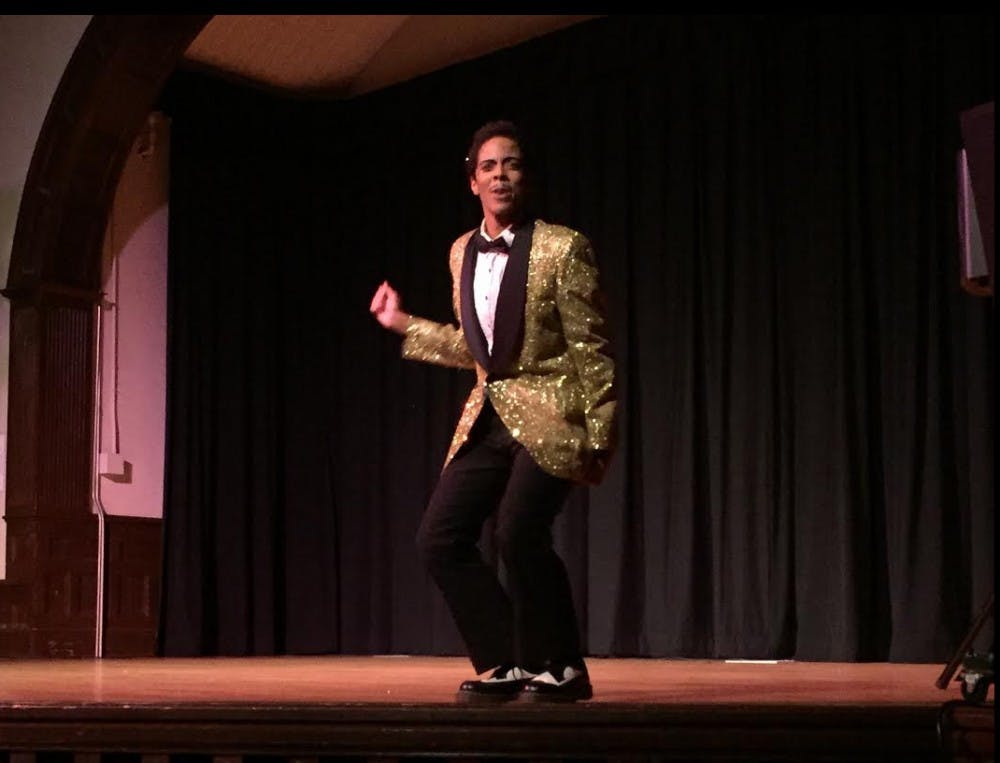Gabriel Rosenberg, assistant professor of women’s studies at Duke, delivered a lecture on the history of drag at the Hayti Heritage Center Monday night.
The lecture was followed by drag performances from performers Vivica C. Coxx, Spray J., Jazmine Brooks and Vivian Vaughn. The event was sponsored by Durham County Library and the Durham Library Foundation as part of their Humanities series and is the second drag-related event in the series.
“Why not wear glitter? We wear glitter to stand out, to be bold, to be bad, to be present and to be fierce,” said Coxx, sheathed in a gold sequin dress.
In his lecture, Rosenberg said that Coxx “brings beauty, comedy and social justice to a head in Durham” through her drag performances. He added that there are “beautiful aesthetic possibilities that are associated with drag, but drag has a very notable and deeply heartening history of political imagination and political possibility.”
Drag is linked to the centuries-old tradition of cotillion—local dances and social events—and has roots in “homosocial spaces” of the 19th century like military camps and mining towns, Rosenberg said, noting that men of that period often engaged in cross-dressing at stag dances. He also linked drag to the idea of "racial passing", or appearing to be another race—citing Ellen and William Craft, who escaped slavery in the early 19th century by disguising themselves as a wealthy white man and his slave.
“Drag, which had enjoyed this visible and notable cultural imprint in the 20s and 30s, goes back underground, back into the drag bars and gay bars and saloons and theaters that we tend to think about in the 60s and 70s,” Rosenberg said.
Vaughn, the reigning winner of Miss Gay North Carolina America—a drag pageant modeled after the Miss America contest—told the audience in a question-and-answer session that although shows like "RuPaul’s Drag Race" have increased attendance at her shows, they have also “changed the trajectory” of drag and launched it into the public eye.
“There’s only so much you can exploit on television,” Vaughn said. “So I would like to say to please support your local drag queens, because ["RuPaul’s Drag Race"] would not exist if this did not exist first.”
Many of the performers said that for them, drag is not only an artistic but a political performance.
“I think drag is really important for relaxing some of our boundaries around gender that are actually societally imposed,” Spray J. said. “It allows us to have the freedom to step across those boundaries and even blur those boundaries.”
Spray J., who earned his Ph.D. in psychology from Duke last year, explained that his origins in drag came while he was a student at Duke.
“I actually started drag when I was a graduate student, and I was sort of looking for something to do outside of my work,” Spray J. said. “You can create your own schedule and it’s super fun, so it was actually a nice way to supplement my grad student stipend too!”
Coxx and Spray J., both Durham residents, said that the drag community in Durham is vibrant and that they find audiences at The Pinhook and The Bar to be particularly strong.
“I do what the Durham community tells me to do, and I put that on,” Coxx said.
The performers noted that drag is a collaborative art for them, and that some drag performers form “families” that support each other.
“I find that the drag community is very close here in Durham,” Spray J. said. “It’s a very close-knit and loving community.”
Coxx echoed Rosenberg and said that drag performers are a central part of the gay community and gay activism.
“As drag queens, we’ve kind of had the responsibility of leading the charge in the gay community, and to be rejected by people in the community, it’s like—you need to look at a history book," Coxx said. "I consider myself a social justice drag queen, so to be rejected by someone I just laugh.”
Get The Chronicle straight to your inbox
Sign up for our weekly newsletter. Cancel at any time.

